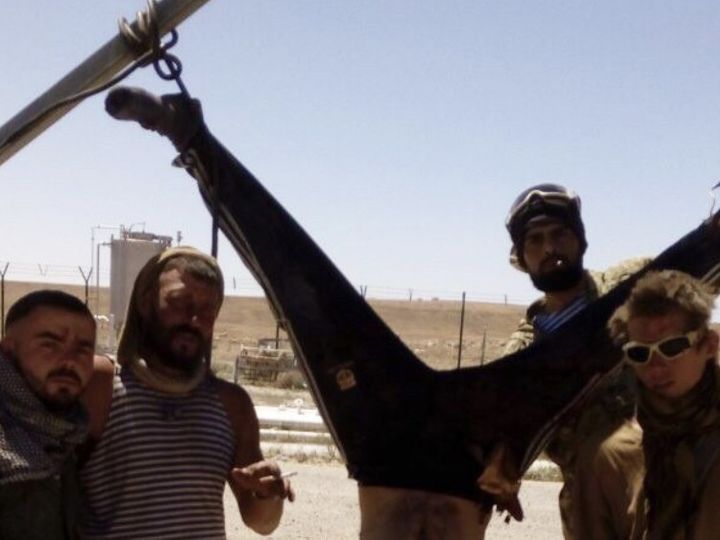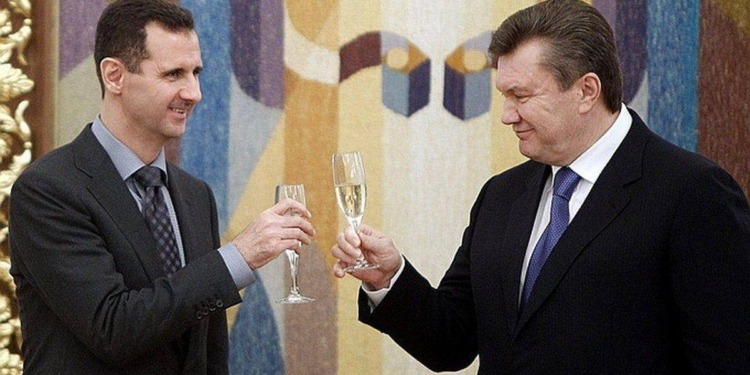Moscow gave asylum to Assad and his family, Russian media reported and Mikhail Ulyanov, Russia’s ambassador to international organisations in Vienna, said on his Telegram channel on Sunday.
International governments welcomed the end of the Assads’ autocratic government, as they sought to take stock of a new-look Middle East.
U.S. President Joe Biden said Syria is in a period of risk and uncertainty, and it is the first time in years that neither Russia, Iran nor the Hezbollah militant organisation held an influential role there.
Bashar Assad and his family are in Moscow, senior Russian diplomat Mikhail Ulyanov said early Monday morning, seemingly confirming previous media reports that the former Syrian president has been granted asylum. The government in Damascus fell to militants on Sunday, Russia’s state agency said.
In 2020 Human Rights Watch documented 46 air and ground attacks, including the use of cluster munitions, that directly hit or damaged civilian objects and infrastructure in Idlib in violation of the laws of war. The strikes killed at least 224 civilians and wounded 561
Ulyanov, who leads Moscow’s delegation to international organizations headquartered in Vienna, said the presence of the Assads in Moscow shows that “Russia does not betray its friends in difficult situations… unlike the US.”
On 30 September 2015, Russia launched a military intervention in Syria after a request by the government of Bashar al-Assad for military support in its fight against the Syrian opposition and Islamic State (IS) in the Syrian civil war. The United Nations said in 2023 ‘Syrian-Russian Alliance Forces Have Committed Violations that Constitute Crimes Against Humanity and War Crimes Through Unlawful Attacks Against Northwestern Syria’, in which the group revealed that approximately 45 civilians, including 13 children, were killed and 51 vital civilian facilities hit in targeted attacks from October 5-12, 2023, at the hands of Syrian-Russian alliance forces.
On Sunday, Russian news agencies cited diplomatic sources as saying that Assad and his family members had arrived in Russia. They were reportedly granted asylum “on humanitarian grounds.”
Assad is known for a brutal rule over Syria, which since 2011 has been devastated by a civil war that ravaged the country and turned it into a breeding ground for extremist group ISIS, while sparking an international proxy war and refugee crisis that saw millions displaced from their homes.

An investigation carried out by the Russian newspaper “Novaya Gazeta” published a video on April 21, showing members of Russian Wagner forces (Russian company provides mercenaries to world countries) where they are torturing, disfiguring and burning a corpse of a victim whose name was reported in the investigation as Hammadi al Bouti while according to investigation carried out by SNHR by contacting the victim’s family SNHR confirm that the victim’s name is Muhammad Taha al Ismail. The victim is from al Kharrita village in the western suburbs of Deir Ez-Zour governorate. He was arrested in 2017 by Syrian regime forces at Syrian- Lebanese border while he was turned from Lebanon to Syria and was taken for conscription. He was arrested again as he was trying to dissent and flee, as documented by SNHR.
SNHR’s Ninth Annual Report on the Most Notable Violations by Russian Forces Since the Launch of Russia’s Military Intervention in Syria on September 30, 2015,
6,969 Civilians Killed, 44 Percent of Them Women and Children, and 1,251 Attacks on Vital Civilian Facilities, at the Hands of Russian Forces.
2024 Data
War began after Assad’s regime refused to bow to mass pro-democracy protests that year during the Arab Spring, instead mounting a brutal crackdown on the peaceful movement – killing and jailing thousands in the first few months alone.
Assad’s forces have since been accused of severe human rights violations and brutal assaults against civilians throughout the 13-year war, including the use chemical weapons against their own people. The United States, Jordan, Turkey and the European Union at the war’s start all called for Assad to step down.
But the heavily Western-sanctioned and internationally isolated regime has clung to power until now thanks to the backing of powerful allies Russia and Iran, and a merciless campaign against opposition.
Testament to the horror of that regime were scenes of jubilant celebration as rebel forces took control of Syrian cities. In Homs, videos geolocated by CNN showed residents tearing apart posters of Assad and his father in scenes that recalled symbolic images from 2011.
Assad took power in an unopposed election in 2000 following the death of his father Hafez al-Assad, who rose from poverty to lead the Baath Party and seized power in 1970, becoming the country’s president the following year. The younger Assad grew up in the shadow of his father, a Soviet ally who ruled Syria for three decades and helped propel a minority Alawite population to key political, social and military posts.
Like the son who succeeded him, Hafez al-Assad tolerated little dissent with oppression widespread and periodic bouts of extreme state violence. In 1982 in the city of Hama – which rebels seized earlier this week – Hafez al-Assad had his army and intelligence services slaughter thousands of his opponents, ending an uprising led by the Muslim Brotherhood.
As a second son not poised to take up his father’s mantle, Assad studied ophthalmology in London until his older brother Bassel, who had been groomed to succeed Hafez, died in a car crash in 1994. Bashar al-Assad was then thrust into the national spotlight and studied military science, later becoming a colonel in the Syrian army.
After his father’s death in June 2000, it took just hours for the Syrian parliament to change the constitution to lower the presidential age of eligibility from 40 to Assad’s age at the time of 34, a move that allowed him to succeed his father after opposition-less elections the following month.
Many observers in Europe and the United States seemed heartened by the incoming president, who presented himself as a fresh, youthful leader who might usher in a more progressive, moderate regime.
Assad’s wife, Asma al-Assad, whom he married in 2000, a former investment banker of Syrian descent who grew up in London, helped burnish that view.
But Western hopes of a more moderate Syria sank when the new leader promptly maintained his country’s traditional ties with militant groups, such as Hamas and Hezbollah. They then turned to outright condemnation of the regime after he met the 2011 pro-democracy groundswell with brutal force.
Russia committed or been accused of committing since the dissolution of the Soviet Union in 1991, as well as the aiding and abetting of crimes by proto-statelets or puppet statelets which are armed and financed by Russia, including in Ukraine, Georgia, Azerbaijan, Ichkeria, Dagestan, Syria. These have included murder, torture, terror, persecution, deportation and forced transfer, enforced disappearance, child abductions, rape, looting, unlawful confinement, inhumane acts, unlawful airstrikes and attacks against civilian objects, use of banned chemical weapons, and wanton destruction.
In May 2011, then US President Barack Obama said Assad’s regime had “chosen the path of murder and the mass arrests of its citizens” and called on him to lead a democratic transition “or get out of the way.”
Assad has been re-elected by sweeping majorities every seven years, most recently in 2021 in what the US, UK, France, Germany and Italy deemed a “fraudulent election.”
An opposition fighter steps on a torn-up portrait of Syria’s President Bashar al-Assad in Hama, a day after rebels captured the city on December 6, 2024.
Assad’s forces were known for brutal tactics during the civil war that ensued after the crackdown on 2011 pro-democracy protests, when an armed opposition made up of small organic militias and some defectors from the Syrian military formed.
On 2013, UN weapons inspectors returned “overwhelming and indisputable” evidence of the use of nerve gas in Syria. Then UN Secretary-General Ban Ki-moon called the August 21 attack described in the report, which took place in the Damascus suburbs, “the worst use of weapons of mass destruction in the 21st century.”
The United States said that attack may have killed more than 1,400, including hundreds of civilians. Syrian officials have repeatedly denied allegations of war crimes and crimes against humanity.








































Discussion about this post